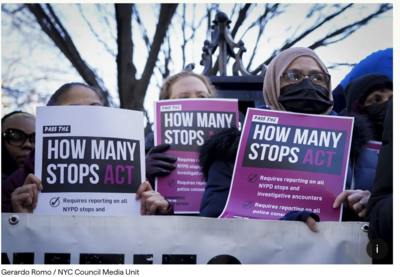A former high-ranking NYPD official is publicly backing a police reporting bill at the center of a fierce battle between Mayor Eric Adams and the City Council, according to a letter and statement shared with Gothamist.
Dr. Tracie Keesee, who was hired in 2016 as the NYPD’s deputy commissioner of training, heads a list of 10 other former law enforcement officials from across the country who penned a letter to the Council that is expected to be released Monday in support of the How Many Stops Act, which requires police to to report all investigatory stops and provide demographic data. The letter comes more than one week after the mayor vetoed the bill, calling it well-intentioned but arguing that the inclusion of low-level stops would be overly burdensome to officers.
“We are deeply disappointed by Mayor Adams’ veto of the How Many Stops Act (HMSA), specifically Intro. 586, as it makes it clear he does not share our commitment to building deep trust between police and the communities they serve,” they wrote.
Keesee, who co-founded a group called the Center for Policing Equity, became the highest-ranking former NYPD official to stand behind the proposed reporting mandate that supporters say address the city’s history of unconstitutional stops that target Black and Latino men.
As a deputy commissioner, Keesee was charged with improving the relations between the community and the NYPD. During her three years on the force, she was appointed as the first ever deputy commissioner of equity and inclusion.
In a statement, a spokesperson for the mayor's office reiterated the administration's concerns that the bill would undermine public safety and said councilmembers should support the veto.
"If implemented, Intro. 586 would undermine that progress and make our city less safe," the spokesperson, Charles Lutvak, said. "We share the Council’s goal of increasing transparency in government and tried to work with them to achieve that — the answer is not to compromise public safety or justice but to work together to craft real solutions. We urge councilmembers to uphold the mayor’s veto."
Sponsors of the bill, including Public Advocate Jumaane Williams and Speaker Adrienne Adams, accused the mayor of exaggerating the length of time such reporting would entail. They said the information could be filled out on smart phones that officers already use.
The mayor, however, has remained steadfast in his opposition to the bill.
Bill Bratton, the former NYPD commissioner who hired Keesee, has sided with the mayor in the debate. During an interview on WABC 770 AM on Sunday, he called the bill “foolish.”
“We're going to continue to speak with the councilmembers, tell them why this bill is extremely harmful to the foundation of our safety, and it's up to them to make the determination,” Adams told reporters last week. “I'm continuing to do my job of educating and trying to get the council to come to understanding that this is not a good bill for the safety of our city. But it's up to them to make that determination.”
The Council is expected to override the mayor’s veto on Tuesday.
In a separate statement, Keesee said that the Council’s legislation “would, simply, require the NYPD to reveal how many people it stops and allow the community of New York to demand change based on those numbers.”
“Mayor Adams’ decision is particularly disheartening for Black and Latinx communities who have faced the worst of the NYPD’s excesses in the past,” she added. “And, given the national attention that the racial disparities in NYPD’s stop and frisk policies attracted—and the legal judgment that they were racially discriminatory and unconstitutional, failing to inform the public how many people officers stop is hard to stomach.”
The fight over the legislation has preoccupied the City Hall in recent weeks, drawing Adams and the Council into a tense and, at times, ugly battle. Over the weekend, discussions around the bill intensified after City Councilmember Yusef Salaam was pulled over by police for having a car with illegally tinted windows.
The NYPD has aggressively sought to lobby the public and lawmakers against the bill. Earlier this month, the department released a contested video showing how the new rules would affect officers.
On Saturday, Adams and police officers hosted nine councilmembers in a ride-along intended to offer them a glimpse of the investigatory process.
Officers are already required to spend time categorizing interactions with civilians captured on body camera footage, according to Edwin Raymond, a former NYPD officer who left the department last year.
Raymond became one of the NYPD’s more high-profile whistleblowers after he joined others in suing the department over what they viewed as racialized policing tactics.
He told Gothamist he believed the Council’s legislation would add a minimal amount of additional work for officers. He said many current officers lack an understanding of the bill’s requirements and what they would entail.
“Once I expressed what it is, then they said, ‘Okay, it’s not that bad. It’s not backbreaking the way I thought,” he said.

